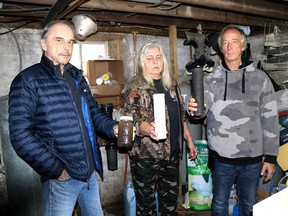For several years, Christine and Terry Burke have relied on friends and family to fill numerous 3.8-liter (one-gallon) jugs with potable water to use at their Mitchell’s Bay-area home.

For several years, Christine and Terry Burke have relied on friends and family to fill numerous 3.8-liter jugs with potable water to use at their Mitchell’s Bay-area home.
Advertisement 2
Article content
They used to get clean water from the well on their property, but it’s contaminated by sediments they say began showing up about eight or nine years ago, a few years after the East Lake St. Clair Wind Farm was constructed nearby.
Article content
Until you experience it, Christine Burke said, “I don’t think anyone can fathom going without potable water for years.”
She said this was a particular challenge when COVID-19 pandemic restrictions were in place.
“We had to go get water; you can’t live without water,” she said.
The Burkes’ water system, with two tanks, four sediment traps and six water filter cartridges, still doesn’t prevent sediment getting through. In addition to other filters, the Burkes use special 0.5-micron filters they can only buy in Toronto to try to block the sediment.
Advertisement 3
Article content
“It’s been a lot of work over the years,” said Terry Burke.
He’s put in all new copper piping in their home and a new line from the house to the well casing, he said.
The Burkes reluctantly use their well water for laundry, dishes and showering.
An all-hazard investigation was undertaken by Ontario’s Health Ministry in 2021. It was prompted by water well interference widely seen by property owners within the North Kent Wind farm project area.
But the investigation was criticized when released in early 2022, because it did not sample sediments in the water, which were deemed to be the cause of the problem.
Numerous water wells in Dover Township and Chatham Township began clogging with sediments after wind turbines were built, which included having piles driven into the bedrock.
Advertisement 4
Article content
Concerns were raised about the potential of dangerous heavy metals being present since the aquifer sits on the Kettle Point black shale formation, known to contain toxic metals. Vibrations caused by construction and operation of the industrial wind turbines have been blamed for stirring up the sediments.
In late May, Chatham-Kent council unanimously passed a motion by North Kent Coun. Rhonda Jubenville formally asking the Health Ministry to complete testing of sediments in well water not done during the all-hazard investigation.
Jubenville said the municipality has sent its request to the ministry twice with no response.
“I’m disappointed that the ministry has not responded, but how do you force them?” she said.
Advertisement 5
Article content
The Daily News also tried to contact the Health Ministry on this issue, but has yet to receive a response.
The lack of response prompted Burke to join with Keith Benn, a geoscientist who served on an expert panel advising the ministry during the all-hazard investigation, to call on Ontario’s ombudsman office to investigate.
Benn said the all-hazard investigation’s scope of work included sampling the water and sediment — very fine particles suspended in the water — to look for health hazards.
The all-hazard investigation was not completed because no sediments from wells in the study were tested, he said.
Benn believes the problem stemmed from sampling equipment being unable to detect fine sediments in the water.
Advertisement 6
Article content
Noting the expert panel only took part in meetings every month or so, it didn’t learn sediments weren’t included in the investigation until sampling was nearly done.
He said the expert panel’s final report recommended sediment sampling be done, using appropriate methods to analyze them for metals.
Another recommendation called for bio-accessibility studies if potentially toxic metals were found in the sediments, he said.
Benn said bio-accessibility studies would determine if stomach juices can free up metals in ingested sediments. This would lead to the need for a bio-availability study to determine if freed-up metals can get into the intestine, blood and organs.
Burke and Benn worked together to raise funds through GoFundMe and other sources to arrange for testing of sediments from nine water wells in wind farm areas, including the Burkes’, at a Michigan lab.
Advertisement 7
Article content
“Every sample that came back had at least some metals, potentially toxic metals, in the sediment,” Benn said.
Most samples showed multiple metals in the sediments, he added.
Their submission to the ombudsman’s office said analysis of samples from the nine wells revealed the sediment contained significant concentrations of metals, including arsenic, barium, cadmium, chromium, cobalt, lead, molybdenum, nickel and, in two cases, mercury.
“I don’t know how the Ministry of Health could justify not proceeding with more work,” Benn said.
Burke and Benn had a teleconference with an ombudsman investigator Dec. 1, which Benn called a good discussion.
Asked if she’s confident something positive will come from an investigation by the ombudsman’s office, Christine Burke said, “That’s all I can pray for.”
Stressing numerous well owners still have problems, Burke said it’s “heartbreaking to be cast aside like we’re nothing,” my lack of ministry response.
Article content
